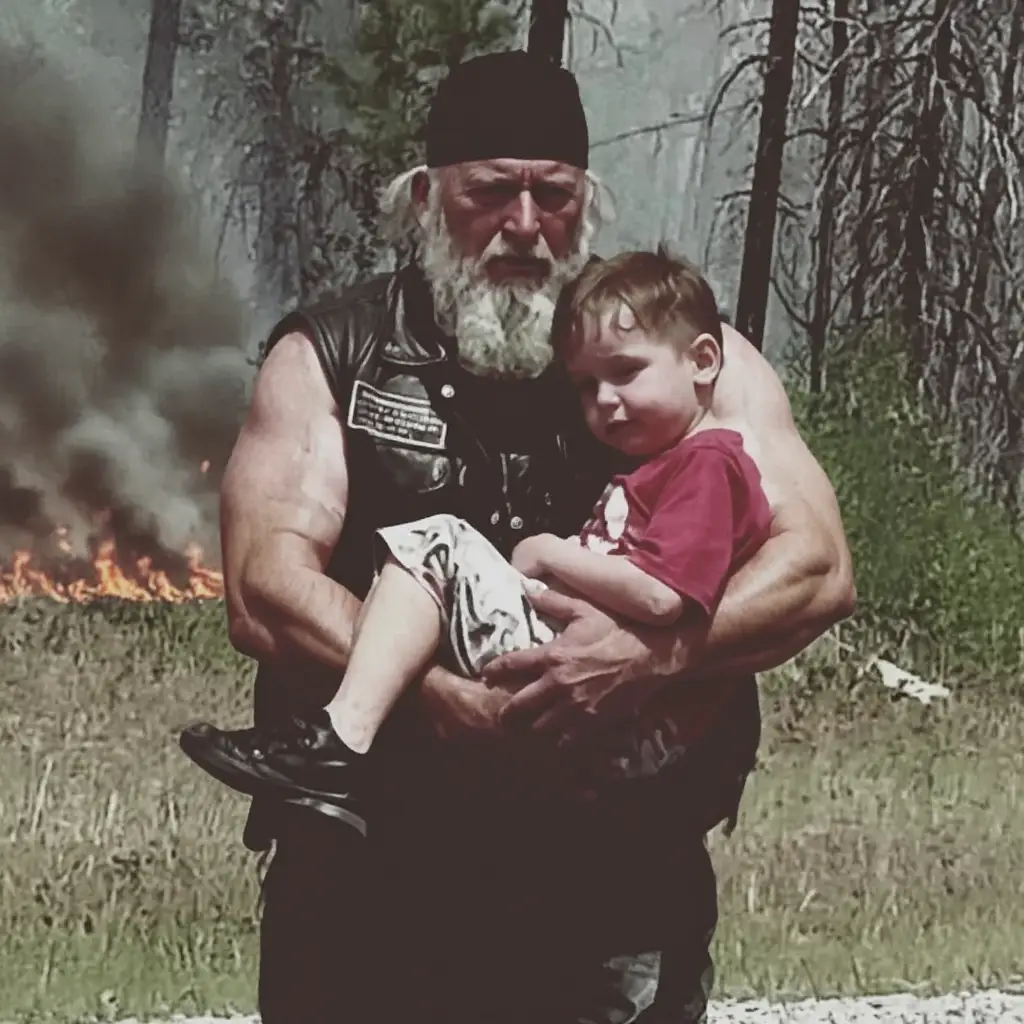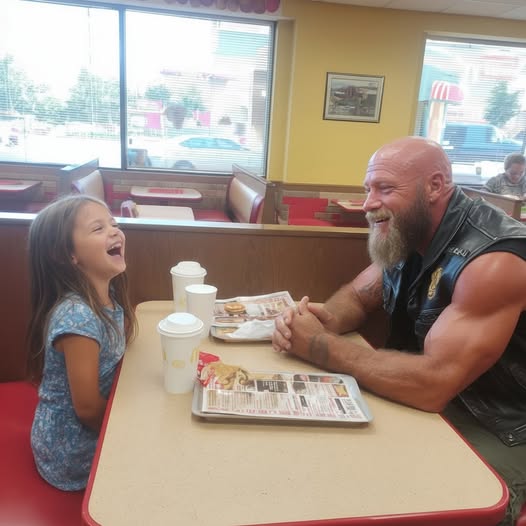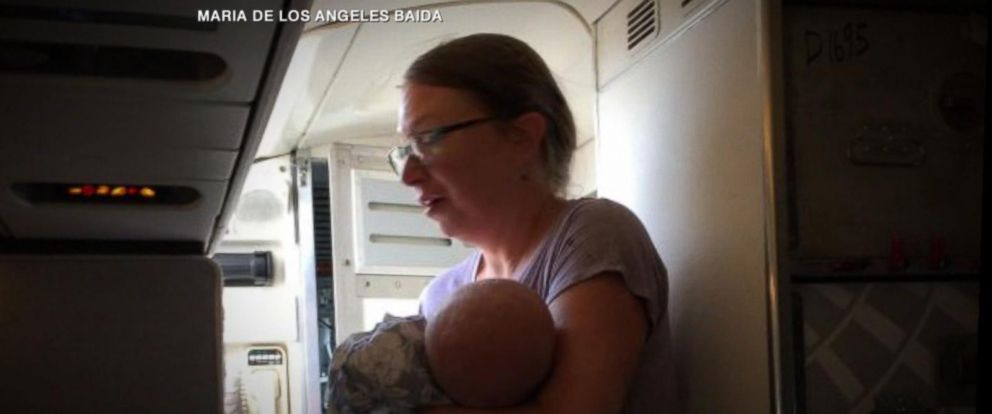The massive biker carried the unconscious four-year-old boy through five miles of forest fire because his wheelchair couldn’t make it through the evacuation route.
Biker Walked Through Flames
I watched from the emergency checkpoint as this leather-clad giant emerged from the smoke, his arms bloody from thorns, his $20,000 Harley abandoned somewhere in the flames, carrying my neighbor’s disabled son like he was made of glass.

The boy’s mother had been screaming that her son was trapped at their cabin when the fire jumped the highway – emergency crews said the roads were impassable, but this biker just nodded, revved his engine, and disappeared into the inferno.
Now he was walking out with little Tommy secured against his chest with his own leather vest, the child’s oxygen tank strapped to his back, his motorcycle club patches singed and melting.
“He needs medical attention immediately,” the biker gasped, his voice raw from smoke. “Kept his oxygen flowing but he’s been unconscious for twenty minutes.”
The paramedics rushed forward, but Tommy’s tiny hand was gripped tight in the biker’s shirt, wouldn’t let go even unconscious. His mother, Sandra, fell to her knees sobbing.
“They said nobody could get through. The fire chief said the road was gone. How did you—”
But the biker had collapsed next to Tommy’s stretcher, and that’s when we saw the real damage that was hidden by his leather vest.
Burns covered most of his back. Deep gashes where he’d clearly pushed through barriers of fallen, burning branches. His hands were raw and blistered. But he hadn’t made a sound of complaint, hadn’t mentioned his own injuries until Tommy was safe.
“Sir, we need to treat you immediately,” a paramedic insisted.
“The boy first,” he growled. “I’m fine.”
He wasn’t fine. Anyone could see that. But he sat there, blood seeping through his jeans, watching as they worked on Tommy.
I recognized him then – Wolf, from the Savage Sons MC. The same club our neighborhood association had petitioned to ban from using our roads. The same bikers the local Facebook group called “undesirable elements” when they’d bought the old warehouse at the edge of town for their clubhouse.
“His wheelchair,” Sandra was sobbing. “It’s still at the cabin. It’s custom-made, costs fifteen thousand dollars, insurance won’t—”
“Ma’am,” Wolf interrupted, his voice gentle despite his obvious pain. “Your boy is alive. That’s what matters.”
But I saw him pull out his phone, sending rapid text messages even as the paramedics tried to get him onto a gurney.
Twenty minutes later, as the medical helicopter was preparing to evacuate Tommy to the children’s hospital, motorcycles started arriving. Not just a few – dozens. Members of the Savage Sons, other clubs, solo riders, all converging on our evacuation center.
“What the hell is this?” the fire chief demanded.
A rider named Tank stepped forward. “Heard there’s families lost everything in the fire. We’re here to help.”
They’d brought trucks, trailers, supplies. Water, blankets, food, medicine. Everything they could grab and load in twenty minutes.
But Wolf was focused on something else. Still refusing treatment, he was talking intensely with another biker, showing him something on his phone. The other man nodded and roared off on his bike, back toward the fire line.
“You can’t go back there!” the fire chief shouted. “The whole mountain is about to go up!”
But he was already gone.
Wolf finally let the paramedics work on him, but kept his eyes on the smoke-filled horizon. Sandra sat beside him, holding Tommy’s hand as they prepared to load him into the helicopter.
“Why?” she asked Wolf. “You don’t even know us. The neighborhood… we were horrible to your club. We tried to get you kicked out. Why would you risk your life for my son?”
Wolf looked at her with eyes that had seen too much. “Lost my own boy ten years ago. Drunk driver. He was six.” His voice broke slightly. “Couldn’t save him. But I could save yours.”
The helicopter lifted off with Tommy and Sandra. Wolf refused to go with them despite the paramedics’ insistence that he needed a burn unit.
Three hours later, as the fire raged closer to our evacuation center, that lone biker returned. Behind him, two more bikes, moving slow. They were towing something.
Tommy’s wheelchair. Somehow, impossibly, they’d gone back to the burning cabin and retrieved it. The seat was singed, the paint bubbled from heat, but it was intact.
“That’s a fifteen-thousand-dollar chair,” I said to Wolf. “You could have been killed going back for it.”
He shrugged, wincing at the movement. “Kid’s gonna need it when he gets out of the hospital. Bad enough he’s losing his home. Shouldn’t lose his freedom too.”
That’s when the story broke wide open. Someone had been livestreaming, and the video went viral within hours. The terrifying biker carrying the disabled child out of a wildfire. The motorcycle club that our “respectable” neighborhood had tried to ban showing up with relief supplies. Bikers risking their lives to save a custom wheelchair.
But what really got attention was what happened next.
Wolf finally collapsed. The burns and smoke inhalation caught up with him. As they loaded him into an ambulance, he was mumbling something over and over.
“Did I get him out in time? Is the boy okay?”
The paramedic assured him Tommy was stable, being treated at Children’s Hospital.
“Good,” Wolf whispered. “Good.”
The next morning, the news was everywhere. The fire had destroyed forty-three homes, including Sandra and Tommy’s cabin. The entire neighborhood we’d been so protective of, the one that had looked down on the Savage Sons MC, was gone.
But the real story was at Children’s Hospital.
Tommy had woken up. First thing he asked for wasn’t his mom or his toys – it was “the man who carried me.”
When Sandra explained that Wolf was in the burn unit, Tommy insisted on seeing him. The doctors tried to explain that he was too sick to visit other patients, but Tommy – this four-year-old who rarely spoke due to his developmental disabilities – wouldn’t stop asking.
Finally, they agreed to a video call.

I was there when it happened. Wolf’s face, half-covered in bandages, lit up when he saw Tommy on the screen.
“Hey, little warrior,” he said softly.
“You saved me,” Tommy said clearly – words his mother had never heard him string together before. “You’re my hero.”
Wolf started crying. This massive, terrifying biker who’d walked through fire, just broke down sobbing.
“You’re my hero too, buddy.”
The story could have ended there. A moment of heroism, a life saved, a community’s prejudice challenged. But the Savage Sons weren’t done.
They organized a fundraiser for the families who’d lost homes. In three days, they raised over $200,000. They partnered with contractors – many of them riders – to start rebuilding. They set up temporary housing in their clubhouse for displaced families, including the same people who’d signed petitions against them.
But the most incredible part was Wolf and Tommy.
As they both recovered, they became inseparable. Wolf would wheel Tommy around the hospital in his recovered chair, both of them covered in bandages, looking like war buddies. The tiny disabled boy and the massive biker, comparing scars and making jokes only they understood.
When Wolf was finally released, he arrived at the hospital with twenty bikers to escort Tommy home – or rather, to the temporary housing the club had arranged for Sandra and Tommy.
“Why are you doing all this?” Sandra asked him again, overwhelmed by the club’s generosity.
Wolf knelt down to Tommy’s level. “Because that’s what clubs do. We take care of our family.”
“But we’re not your family,” Sandra protested.
“You are now,” Wolf said simply. “Tommy’s an honorary Savage Son. Got the scars to prove it.”
He pulled out a tiny leather vest, custom-made for a four-year-old, with a special patch: “Bravest Warrior” with Tommy’s name underneath.
Tommy wore that vest everywhere. To physical therapy. To doctor’s appointments. To the grocery store. This little boy who’d been trapped in a burning cabin, carried through flames by a stranger, now had an entire motorcycle club as his extended family.
The neighborhood that had tried to ban the Savage Sons? They unanimously voted to give the club a commendation for heroism. The same Facebook group that had called them “undesirable” now shared posts about their charity work, their community service, their sacrifice.
But the real change was in Tommy.
The trauma of the fire, instead of setting him back, seemed to have awakened something. He started talking more. Engaging more. And always, always talking about Wolf and the bikers.
“They’re not scary,” he’d tell anyone who’d listen. “They’re protectors. Like dragons. They look scary but they keep you safe.”
Six months later, at the ribbon-cutting for the first rebuilt home, Tommy cut the ribbon from his wheelchair, Wolf beside him. The entire Savage Sons MC was there, along with hundreds of community members.
The fire chief who’d yelled at them for going back into the fire zone? He shook Wolf’s hand and said, “I was wrong about you guys. We all were.”
Wolf just nodded. “People fear what they don’t understand. We get it.”
“No,” the chief said. “We were just prejudiced assholes. You proved that when everyone else said ‘impossible,’ you said ‘watch me.’ That’s not about being bikers or not. That’s about character.”
Today, three years later, Tommy is seven. He still can’t walk, but he’s thriving. He reads at grade level, has friends, and every Sunday, the Savage Sons take him for rides in a special adaptive sidecar Wolf custom-built for his wheelchair.
The boy who doctors said might never speak in full sentences now gives presentations at school about fire safety, disability awareness, and most importantly, not judging people by their appearance.
“My bikers look mean,” he always says, getting giggles from his classmates. “But they carried me through fire. Real heroes don’t always wear capes. Sometimes they wear leather and ride motorcycles.”
Wolf never had any children after losing his son. But now he has Tommy. Not legally – Sandra remains his devoted mother – but in every way that matters. He’s at every doctor’s appointment, every therapy session, every school play.
“You gave me back my purpose,” Wolf told Sandra once. “After my boy died, I was just existing. Riding, drinking, fighting. Empty. But Tommy… saving him saved me too.”
The warehouse that houses the Savage Sons’ clubhouse now has a wheelchair ramp, a fully accessible bathroom, and a play area designed for children with disabilities. They host weekly support groups for special needs families. They organize adaptive sports days. They’ve become everything the neighborhood never expected – not just bikers, but pillars of the community.
And it all started with one biker who saw a child in danger and didn’t hesitate. Who walked through fire carrying someone else’s most precious cargo. Who chose to be the hero that little boy needed, even when the world had already decided he was the villain.
The sign entering our rebuilt neighborhood now reads: “Protected by the Savage Sons MC – Heroes Come in All Forms.”
But Tommy says it better, in the thank you card he made Wolf that hangs in the clubhouse, surrounded by tough-guy motorcycle memorabilia:
“Thank you for being my dragon. Thank you for carrying me when I couldn’t run. Thank you for showing everyone that different isn’t bad, it’s just different. Love, your littlest brother, Tommy.”
Below it, in Wolf’s rough handwriting:
“Thank you for reminding me that heroes don’t always wear capes. Sometimes they’re four years old and braver than any biker I’ve ever known. Love you, little warrior.”
That’s the thing about real strength. It’s not about the leather or the motorcycles or the tough exterior. It’s about being willing to walk through hell for someone who needs you.
Even if they’re strangers.
Even if their community hates you.
Even if you might not make it out.
Because that’s what real bikers do.
They ride toward the fire, not away from it.




